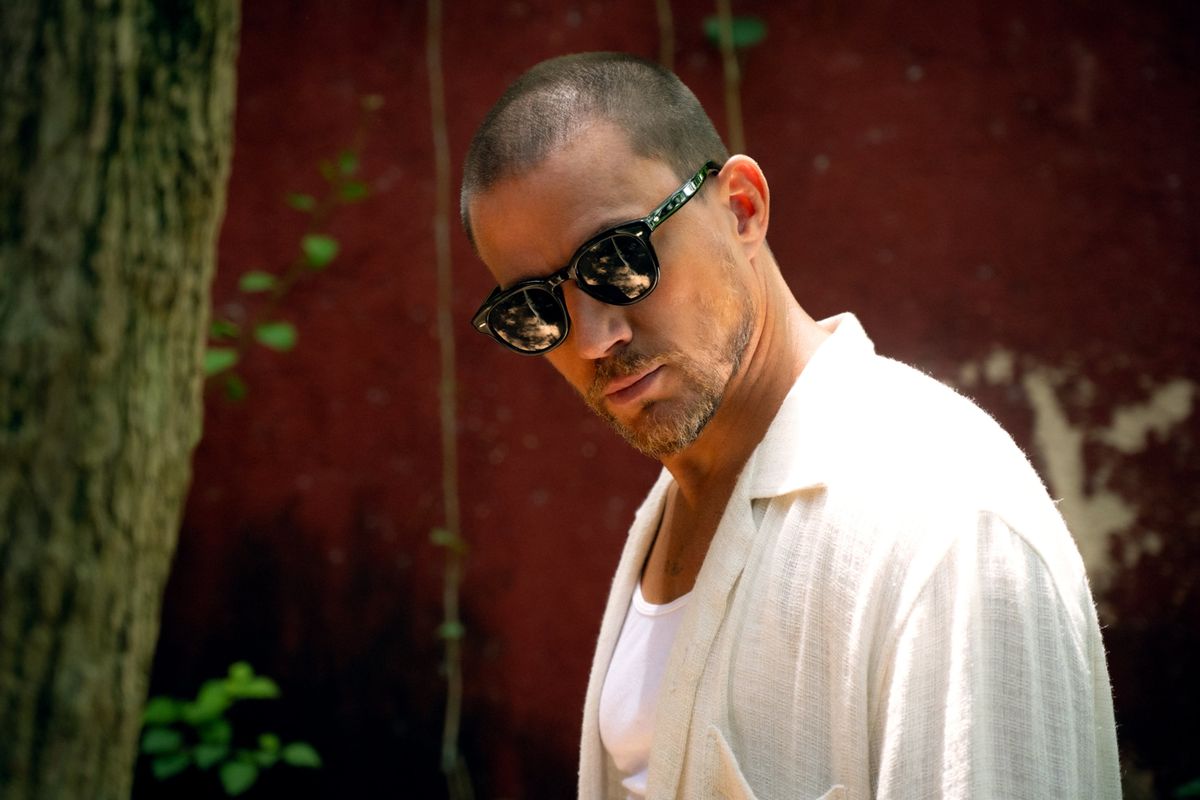Movie review: ‘Blink Twice’ puts suspense in full view, but no message comes into focus

In her daring directorial debut, “Blink Twice,” writer/director Zoë Kravitz doesn’t flinch once – not even when her film might be served by looking away. She maintains a steely gaze in this caustic social horror fable, laced with black comedy, which nods to Jordan Peele’s “Get Out,” though Kravitz chooses to aim her artistic weapon at sexual politics, not necessarily race. Co-written with E.T. Feigenbaum, “Blink Twice” is a big, bold swing from the actress-turned-filmmaker, even if her message becomes muddled along the way. It’s clear Kravitz wants to make a statement with this film. What’s less clear is what exactly that statement might be.
“Blink Twice” opens with a dead-eyed scroll in a dingy bathroom; our protagonist, Frida (Naomi Ackie), thumbs her phone screen on the toilet catatonically, observing the lives of others on Instagram, before she and her roommate Jess (Alia Shawkat) rush to work, serving champagne and canapés at a swanky gala hosted by a disgraced tech mogul, Slater King (Channing Tatum). Yearning to feel a part of something bigger, the cater waiters slip into slinky gowns and join the party themselves, warmly welcomed into an inner circle of wealthy men as beautiful young women typically are. Jet off to Slater’s private island with his pals? Frida’s been longing for a vacation.
Kravitz observes this moneyed milieu well, and what she capably achieves in “Blink Twice” is an absurdist comedy of gendered manners once the guys (Tatum, Simon Rex, Haley Joel Osment, Levon Hawke and Christian Slater) and gals (Ackie, Shawkat, Adria Arjona, Liz Caribel and Trew Mullen) touch down at Slater’s secluded colonial spread located in a lush tropical forest. Outfitted in matching white bikinis and resort wear, the girls are plied with fine wine, fine food and good drugs. The setting and its accoutrements couldn’t be more richly luxurious, but Kravitz presents this world with a sickening, unsettling hyperreality.
Everything feels off in “Blink Twice,” intentionally so. The style is quite jarring, with an abrasiveness that’s almost chafing to watch. The camera angles are strange, the edit jagged, as Kravitz and editor Kathryn J. Schubert construct scenes as if they’re all montage, with seconds and even minutes dropping out. The images created by cinematographer Adam Newport-Berra are saturated, too bright, and have an almost burning lucidity and crispness; the sound design is also overly pronounced and too sharp. This postcard-perfect setting becomes almost unbearable to endure.
It’s a terrible truth to realize that you can have all of the nice things and still be having a bad time. Jess eventually realizes it, after a spree of endless nights spent binging on fun-fun-fun, the girls racing around the lawn in a champagne and psychedelics-induced stupor after their stultifying dinners with the men. Of course something’s not right. They have no phones, no one knows what day it is, and mysterious injuries keep appearing. When Jess goes missing and no one seems to remember she was even there, it’s up to Frida to claw her way out of the fog and find out what happened to her best friend.
Kravitz nails the social analysis and the dark, satirical tone, but as the film becomes a horror/suspense thriller, her directorial execution falters. There are some dynamic shots and compositions, and overt references to her inspirations, but the element of suspense and her ability to stage a horror sequence is lacking. She doesn’t shy away from the ugly truth at the center of her story, but Kravitz miscalculates the careful calibration of “conceal” vs. “reveal” that is necessary in horror filmmaking, making the mistake of showing us the monster clearly, forgetting that what the audience can’t see is far scarier than what they can.
Despite its flaws, what Kravitz demonstrates with “Blink Twice” is a directorial vision bursting with creative, audacious choices, at least cinematically (narratively, the script is riddled with ideas that are rather facile and preposterous). It’s a fine first effort, and she pulls fantastic performances out of Ackie, Arjona and especially Tatum, his quiet, seductive menace boiling over impressively.
Kravitz, however, never works out exactly what she wants to say about sex, power and revenge. A deeply cynical coda at the end of the film undercuts any “empowerment” themes that might naturally emerge from this story. Successfully blending righteous rage, sardonic humor and a fist-pumping “girl power” narrative is quite a challenging task, if that’s even what she wants to do . Ultimately, there’s a certain emotion and earnestness missing from “Blink Twice” that would undergird this entire endeavor and keep it from feeling so hollow. But the unrelenting cynicism robs the film of any impactful meaning. Maybe that’s the point, but it doesn’t feel good.